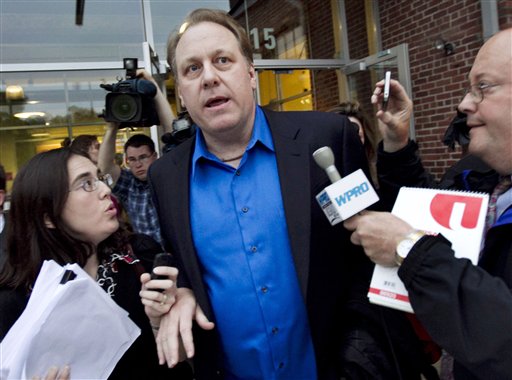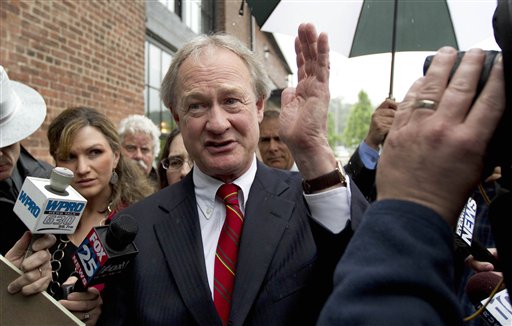PROVIDENCE, R.I. — The government deal that guaranteed a $75 million loan for baseball star Curt Schilling’s video game company focused almost exclusively on how quickly the firm would bring jobs to Rhode Island and overlooked requirements for attracting outside investment or other steps that could have helped protect the public’s money.
The state’s agreement with 38 Studios in 2010 demanded job creation — and virtually nothing else — at a pace described as aggressive both by former employees and those familiar with the video game industry. And Schilling’s firm hired even more quickly than the state required, draining its resources faster than if it had grown at a pace more typical of startups.
While Rhode Island was by far the company’s biggest investor, officials did not demand a seat on its board or require that 38 Studios raise outside capital according to any timetable, though the firm’s success hinged on its ability to bring in the tens of millions of dollars needed to finish its game.
Gaming industry and other experts agreed in interviews with The Associated Press that, in short, the state Economic Development Corp. crafted an agreement under which 38 Studios could fail despite, and in some ways because of, its attainment of every milestone Rhode Island set down.
“I think it’s kind of stupid for anybody who isn’t familiar with the industry to invest in it,” said gaming industry analyst Michael Pachter, of the firm Wedbush Securities. “You want to believe that the state did their homework and they’re sophisticated investors and understood the risks, but clearly they didn’t. Obviously they thought they were buying jobs.”
38 Studios laid off its nearly 300 employees in Rhode Island in May and filed for bankruptcy protection in June. The state, which has the country’s second-highest unemployment rate, is likely on the hook for more than $100 million, including the $75 million in bonds it floated as part of the deal, plus interest.
Judy Chong, an EDC spokeswoman, said the agency is doing an “extensive review” of the 38 Studios transaction and could not answer questions from The Associated Press until it was complete.
Keith Stokes, who resigned as executive director of the EDC in May, and Michael Saul, the EDC’s former managing director of finances, did not return calls seeking comment.
Known for his grit and gusto, Schilling became a Boston Red Sox hero in 2004, pitching on an injured ankle that stained his sock with blood in Game 6 of the American League Championship Series. The team went on to win the World Series.
He founded 38 Studios — initially Green Monster Games — in Massachusetts two years later, naming it for his jersey number. He reportedly met Rhode Island’s governor at the time, Donald Carcieri, during a film fundraiser at Schilling’s home in March 2010, and the loan guarantee deal that lured him to Rhode Island took shape quickly over the next few months.
Schilling has not responded to the AP’s requests for comment.
38 Studios planned to hire aggressively on the way to meeting the launch date for its “massively multiplayer online game” — games that are incredibly expensive and time-consuming to create. The state offered an incentive for the fast-paced hiring.
The EDC built into the deal a $7,500 per-job penalty if 38 Studios fell short of its hiring requirements. The company brought on workers even faster than estimated, according to the EDC, and some at 38 Studios worried the growth was too fast for the company’s good — and ultimately not sustainable, given its difficulty attracting investment.
Employees had no indication the company was in financial trouble until they didn’t get paid; within weeks, all of them would be let go. In retrospect, some employees wondered “had we been burning slower, with a smaller team and released a smaller game, we could have at least got to the point to where we were bringing in revenue and then ramped up accordingly,” said a laid-off employee who spoke on the condition of anonymity because he feared for his prospects of future employment.
38 Studios got nearly $13 million from the state when the loan guarantee agreement was finalized in November 2010 and $9.4 million more in December when it announced a move date, according to the EDC.
It received $17.2 million in April 2011 after creating at least 80 jobs with a salary of at least $67,500. It was estimated the firm would hire another 45 employees by November 2011, but it reached that mark in April, as well, the EDC said, allowing it to access $4.2 million more.
The company then got $1.6 million at the start of November 2011 for creating at least an additional 125 jobs. That mark had been expected at the end of January this year.
The company also got funds when it landed a distribution deal for its game.
By the end of 2011, the firm had already spent all the money due it under the agreement — nearly $50 million, an audit conducted for the state by Braver PC found. The rest of the money was kept in reserve accounts.
The EDC has hired an outside attorney to determine whether the state can recover any money from individuals or groups involved in the loan guarantee. Federal and state authorities have also launched investigations into financial transactions at 38 Studios.
Pachter, the analyst, said most gaming studios typically don’t have more than 200 employees. The game 38 Studios was making might have required twice that manpower toward the end of its development, he said. But the company fell behind that schedule; Gov. Lincoln Chafee has said the game was still a year from release by the time 38 Studios filed for bankruptcy.
While the state focused on job creation targets in negotiating with 38 Studios in 2010, the EDC would much later suggest new guidelines for evaluating whether startups like 38 Studios — without any revenue — should get a loan guarantee.
Guidance issued in April, as 38 Studios’ financial woes spilled into public view, calls for at least a 30 percent “co-investment”— up front — and a personal guarantee from anyone with 20 percent or more ownership in a company. Schilling had a nearly 83 percent stake in 38 Studios.
The EDC has since capped at $10 million the amount a single company can get under the “Job Creation Guaranty Program” — a common practice by states with incentive programs designed to spur job creation.
The Washington-based nonprofit Good Jobs First, which tracks state and local economic development subsidies, says Rhode Island’s massive award to 38 Studios runs contrary to the idea behind such programs, which is to spread the risk around. 38 Studios got 60 percent of the $125 million available in the program.
Barry Gilbert, of Boston-based Strategy Analytics, prepared a report for the EDC in 2010 assessing the video game market and the potential benefits and risks of the deal. It noted that 38 Studios’ focus on a single game, code-named Copernicus, left “little wiggle room” and was analogous to an “all-in” hand.
Gilbert said he was surprised to learn the loan guarantee program had no caps.
That seemed to stem, Gilbert said, from desperation for economic development, paired with excitement over Schilling’s involvement and a belief that “38 Studios was the guy that was going to carry the torch and bring them to the top of the mount.”
Send questions/comments to the editors.




Success. Please wait for the page to reload. If the page does not reload within 5 seconds, please refresh the page.
Enter your email and password to access comments.
Hi, to comment on stories you must . This profile is in addition to your subscription and website login.
Already have a commenting profile? .
Invalid username/password.
Please check your email to confirm and complete your registration.
Only subscribers are eligible to post comments. Please subscribe or login first for digital access. Here’s why.
Use the form below to reset your password. When you've submitted your account email, we will send an email with a reset code.